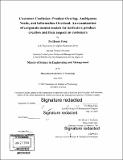Customer confusion: product overlap, ambiguous needs, and information overload : an examination of corporate mental models for derivative product creation and their impact on customers
Author(s)
Fang, Po-Hsuan.
Download1119537201-MIT.pdf (8.223Mb)
Alternative title
Examination of corporate mental models for derivative product creation and their impact on customers
Other Contributors
Massachusetts Institute of Technology. Engineering and Management Program.
System Design and Management Program.
Advisor
Bruce G. Cameron.
Terms of use
Metadata
Show full item recordAbstract
Companies in highly competitive industries often develop incremental products to meet diverse customer needs or to gain share from competitors. However, in order to help customers to choose between derivatives, companies also present more detailed product specifications or features to their customers, resulting in customer confusion. We categorized customer confusion into three facets: product overlap, ambiguous needs, and information overload and discussed each confusion in three case studies. This thesis presents a theory of mental models for companies facing this issue, and uses three case studies to examine the issue : Groceries (Trader Joes), Wearable Devices (Fitbit), and Semiconductor (Texas Instruments). We conclude that product ambiguity is the dominant type of customer confusion in the grocery retail industry. Trader Joe's has adopted the no sale strategy to mitigate this effect. We identify information overload as the most significant concern in wearable devices from the Fitbit case, where online user reviews supplement specification information. Finally, we find that contextual ambiguity is a huge problem for the customers in the semiconductor industry. Several strategies such as customer support and enhanced web content are identified to reduce this ambiguity. We propose three system diagrams showing how company strategies affect customer confusion regarding different levels of product knowledge and ability to acquire new knowledge. The diagrams shed light on how sales support could intervene effectively, based on the customer type and confusion type.
Description
Thesis: S.M. in Engineering and Management, Massachusetts Institute of Technology, System Design and Management Program, 2019 Cataloged from PDF version of thesis. Includes bibliographical references (pages 49-50).
Date issued
2019Department
Massachusetts Institute of Technology. Engineering and Management ProgramPublisher
Massachusetts Institute of Technology
Keywords
Engineering and Management Program., System Design and Management Program.